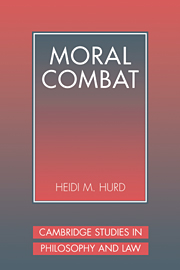Book contents
- Frontmatter
- Contents
- Preface
- Acknowledgments
- Part I The Dilemma of Legal Perspectivalism
- Part II Sources of the Dilemma of Legal Perspectivalism
- Part III The Moral Case for Legal Perspectivalism
- Part IV The Moral Case Against Legal Perspectivalism
- Part V Resolving the Dilemma of Legal Perspectivalism
- Bibliography
- Index
Part IV - The Moral Case Against Legal Perspectivalism
Published online by Cambridge University Press: 05 November 2011
- Frontmatter
- Contents
- Preface
- Acknowledgments
- Part I The Dilemma of Legal Perspectivalism
- Part II Sources of the Dilemma of Legal Perspectivalism
- Part III The Moral Case for Legal Perspectivalism
- Part IV The Moral Case Against Legal Perspectivalism
- Part V Resolving the Dilemma of Legal Perspectivalism
- Bibliography
- Index
Summary
In the previous part, I canvassed the reasons to think that legal roles provide actors with unique reasons for action – reasons that might tip the balance of reasons for judicial action in favor of punishing a justifiably disobedient citizen, or reasons that might tip the balance of reasons for constitutional action in favor of disciplining a justifiably disobedient judge. If such arguments are persuasive, then we must conclude that the correspondence thesis as applied to punishment is false: It is not the case that the justifiability of an action makes wrong the punishment of that action. A citizen might be justified in breaking the law, but a judge might be justified in punishing her for her disobedience. Alternatively, a judge might be justified in breaking the law and acquitting a justifiably disobedient citizen, but a system designer might be justified in disciplining such judicial disobedience.
If the correspondence thesis is false as applied to punishment, then the appropriate means of resolving the dilemma of legal perspectivalism with which we began in Chapter 1 is by abandoning the principle of weak retributivism. We should admit once and for all that individuals should sometimes be blamed for acting blamelessly and punished for doing precisely what they should have done. Such a solution has the virtue of preserving the integrity of our systemic values. If judges are morally licensed to punish justifiably disobedient citizens when liberty, equality, and cooperatively achieved public goods are in jeopardy, then we need not fear that recognition of the moral justifiability of certain acts of disobedience will threaten the rule of law.
- Type
- Chapter
- Information
- Moral CombatThe Dilemma of Legal Perspectivalism, pp. 253 - 254Publisher: Cambridge University PressPrint publication year: 1999

